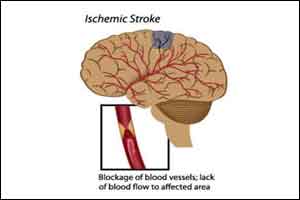- Home
- Editorial
- News
- Practice Guidelines
- Anesthesiology Guidelines
- Cancer Guidelines
- Cardiac Sciences Guidelines
- Critical Care Guidelines
- Dentistry Guidelines
- Dermatology Guidelines
- Diabetes and Endo Guidelines
- Diagnostics Guidelines
- ENT Guidelines
- Featured Practice Guidelines
- Gastroenterology Guidelines
- Geriatrics Guidelines
- Medicine Guidelines
- Nephrology Guidelines
- Neurosciences Guidelines
- Obs and Gynae Guidelines
- Ophthalmology Guidelines
- Orthopaedics Guidelines
- Paediatrics Guidelines
- Psychiatry Guidelines
- Pulmonology Guidelines
- Radiology Guidelines
- Surgery Guidelines
- Urology Guidelines
Eye stroke patients at high risk of future ischemic stroke

Too few patients with retinal infarction, or loss of blood flow in the eye, are evaluated for stroke risk or seen by a neurologist, putting them at increased risk for another stroke, according to preliminary research presented at the American Stroke Association's International Stroke Conference 2018, a world premier meeting dedicated to the science and treatment of cerebrovascular disease for researchers and clinicians.
The study showed that 1 in 100 patients in the study experienced an ischemic stroke within 90 days of a retinal infarction. In addition, among 5,688 individuals with retinal infarction, only one-third underwent basic testing, and fewer than one in 10 were seen by a neurologist. Within 90 days of symptoms, only 34 percent received cervical carotid imaging tests; 28.6 percent received heart-rhythm testing; 23.3 percent received echocardiography, and 8.4 percent were evaluated by a neurologist.
The findings illustrate the importance of expediting stroke evaluation testing for those who have experienced a retinal infarction, and for increased awareness and understanding about retinal infarctions and how they may signal future strokes. Retinal infarction may provide an opportunity in preventing stroke, explained lead study author Alexander Merkler, M.D., a neurologist at Weill Cornell Medical Center in New York.
"Our research tells us that we need to do a better job at evaluating patients with retinal infarction and making sure they receive the same standard of care tests that someone with a stroke in the brain would have," said Merkler. "We need to work more closely with ophthalmologists to ensure patients with stroke of the eye get the appropriate tests and treatments in a timely manner."
The findings are based on Medicare ophthalmology claims from between 2009 and 2015. Retinal infarction is a form of ischemic stroke in the eye. Symptoms can include blurred vision or vision loss, and tissue damage to the eye itself. Risk factors associated with stroke in the brain, including high blood pressure, high cholesterol, diabetes, and atrial fibrillation, are also associated with retinal infarction.
Stroke is the fifth-leading cause of death in the United States, accounting for one in every 20 deaths, but less is known about retinal infarction, which may go undetected and under-treated. Merkler plans to study the connections between retinal infarction and stroke using brain magnetic resonance imaging tests to see what's happening.

Disclaimer: This site is primarily intended for healthcare professionals. Any content/information on this website does not replace the advice of medical and/or health professionals and should not be construed as medical/diagnostic advice/endorsement or prescription. Use of this site is subject to our terms of use, privacy policy, advertisement policy. © 2020 Minerva Medical Treatment Pvt Ltd